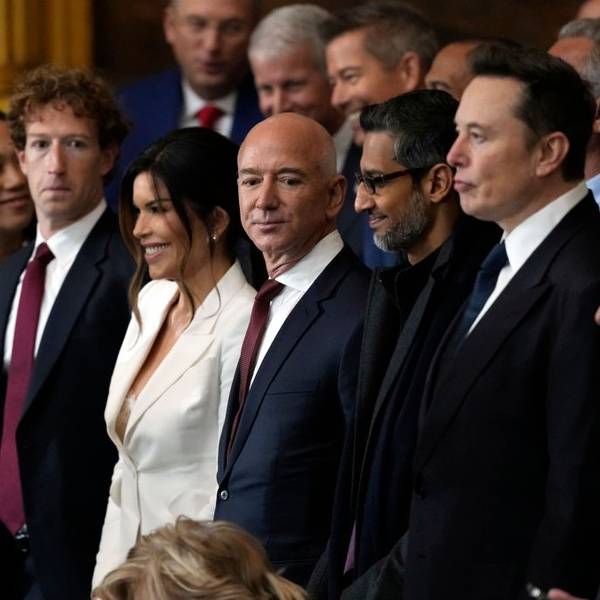Amid #DeleteFacebook Fervor, Experts Say Time to Tackle Big Data Profiteers
A social media platform like this "is the ultimate surveillance tool: an addictive product that's optimized to collect and analyze the intimate details of our lives."

While the pro-Trump data firm Cambridge Analytica has received a flood of media attention in recent days following reports that it harvested the personal information of over 50 million Facebook users, advocacy groups and experts are warning against allowing focus on this scandal alone to obscure the fact that major tech companies have been allowed to build an entire industry by exploiting the personal data of everyone who uses their platforms.
"The fact is that companies like Facebook and Google are the real malicious actors here--they are vital public communications systems that run on profiling and manipulation for private profit."
--Yasha Levine
Judging by the popularity of the hashtag #DeleteFacebook--which went viral on Wednesday night, much to the dismay of CEO Mark Zuckerberg--many users of the social media giant agree that Facebook should bear the brunt of the criticism for a data breach that it did nothing to stop and that its "data-fueled" business practices made possible.
Though Cambridge Analytica is easy to revile, as one commentator put it, "the real bad guy in this story" is Facebook.
But as investigative journalist Yasha Levine argued in a statement on Thursday, the entire "present-day freakout over Cambridge Analytica needs to be put in the broader historical context of our decades-long complacency over Silicon Valley's business model."
"The fact is that companies like Facebook and Google are the real malicious actors here--they are vital public communications systems that run on profiling and manipulation for private profit without any regulation or democratic oversight from the society in which it operates," Levine added.
The explosive Cambridge Analytica scandal--just one of many in Facebook's relatively short history--comes at a time when privacy advocates and critics of corporate power are more concerned than ever about the growing concentration of data into the hands of just a few tech giants like Google and Facebook. After it is gathered, this personal data is then used by businesses to run targeted Facebook ads based on users' location, relationship status, and dozens of other metrics.
"What do these companies know about us, their users?" asks Levine. "Well, just about everything."
In an email to supporters on Thursday, Fight for the Future deputy director Evan Greer wrote that Facebook has constructed "the ultimate surveillance tool: an addictive product that's optimized to collect and analyze the intimate details of our lives."
Once that personal data is collected, Greer noted, these companies "package it and sell it to the highest bidder or, in some cases, give it away for free in order to attract more business."
"We may not get another opportunity like this to push tech companies to change course and ensure that the Internet we leave to our children is better than the one we have now," Greer said. "Demanding that Facebook come clean about their practices, and taking immediate steps to protect user data by default, is an important start."
"Demanding that Facebook come clean about their practices, and taking immediate steps to protect user data by default, is an important start."
--Evan Greer, Fight for the Future
But Greer acknowledges that getting Facebook to admit its mistakes is hardly enough, and a number of solutions have been proposed in recent days to both prevent the kind of data harvesting carried out by Cambridge Analytica and address the more widespread problems that stem from Facebook's structure and business model.
Some analysts have argued that Facebook and other tech giants that vaccuum up personal data for profit are simply "too big to serve the public interest" and should be nationalized.
Others, like Barry Lynn and Matt Stoller of the Open Markets Institute, have proposed steps that can be taken in the short-term by the Federal Trade Commission (FTC) to "restructure" Facebook in a way that benefits the public, like imposing strict privacy rules and spinning off the company's ad network--a move that would "eliminate, in one swoop, most of the incentive that Facebook now has to amass data," Lynn and Stoller note.
Whatever the specific solution, former Facebook investor Roger McNamee and former Facebook operations manager Sandy Parakilas argued in an article for The Guardian on Monday that it is "past time that the U.S. recognize that data is too important to be unregulated."
An Urgent Message From Our Co-Founder
Dear Common Dreams reader, The U.S. is on a fast track to authoritarianism like nothing I've ever seen. Meanwhile, corporate news outlets are utterly capitulating to Trump, twisting their coverage to avoid drawing his ire while lining up to stuff cash in his pockets. That's why I believe that Common Dreams is doing the best and most consequential reporting that we've ever done. Our small but mighty team is a progressive reporting powerhouse, covering the news every day that the corporate media never will. Our mission has always been simple: To inform. To inspire. And to ignite change for the common good. Now here's the key piece that I want all our readers to understand: None of this would be possible without your financial support. That's not just some fundraising cliche. It's the absolute and literal truth. We don't accept corporate advertising and never will. We don't have a paywall because we don't think people should be blocked from critical news based on their ability to pay. Everything we do is funded by the donations of readers like you. Will you donate now to help power the nonprofit, independent reporting of Common Dreams? Thank you for being a vital member of our community. Together, we can keep independent journalism alive when it’s needed most. - Craig Brown, Co-founder |

While the pro-Trump data firm Cambridge Analytica has received a flood of media attention in recent days following reports that it harvested the personal information of over 50 million Facebook users, advocacy groups and experts are warning against allowing focus on this scandal alone to obscure the fact that major tech companies have been allowed to build an entire industry by exploiting the personal data of everyone who uses their platforms.
"The fact is that companies like Facebook and Google are the real malicious actors here--they are vital public communications systems that run on profiling and manipulation for private profit."
--Yasha Levine
Judging by the popularity of the hashtag #DeleteFacebook--which went viral on Wednesday night, much to the dismay of CEO Mark Zuckerberg--many users of the social media giant agree that Facebook should bear the brunt of the criticism for a data breach that it did nothing to stop and that its "data-fueled" business practices made possible.
Though Cambridge Analytica is easy to revile, as one commentator put it, "the real bad guy in this story" is Facebook.
But as investigative journalist Yasha Levine argued in a statement on Thursday, the entire "present-day freakout over Cambridge Analytica needs to be put in the broader historical context of our decades-long complacency over Silicon Valley's business model."
"The fact is that companies like Facebook and Google are the real malicious actors here--they are vital public communications systems that run on profiling and manipulation for private profit without any regulation or democratic oversight from the society in which it operates," Levine added.
The explosive Cambridge Analytica scandal--just one of many in Facebook's relatively short history--comes at a time when privacy advocates and critics of corporate power are more concerned than ever about the growing concentration of data into the hands of just a few tech giants like Google and Facebook. After it is gathered, this personal data is then used by businesses to run targeted Facebook ads based on users' location, relationship status, and dozens of other metrics.
"What do these companies know about us, their users?" asks Levine. "Well, just about everything."
In an email to supporters on Thursday, Fight for the Future deputy director Evan Greer wrote that Facebook has constructed "the ultimate surveillance tool: an addictive product that's optimized to collect and analyze the intimate details of our lives."
Once that personal data is collected, Greer noted, these companies "package it and sell it to the highest bidder or, in some cases, give it away for free in order to attract more business."
"We may not get another opportunity like this to push tech companies to change course and ensure that the Internet we leave to our children is better than the one we have now," Greer said. "Demanding that Facebook come clean about their practices, and taking immediate steps to protect user data by default, is an important start."
"Demanding that Facebook come clean about their practices, and taking immediate steps to protect user data by default, is an important start."
--Evan Greer, Fight for the Future
But Greer acknowledges that getting Facebook to admit its mistakes is hardly enough, and a number of solutions have been proposed in recent days to both prevent the kind of data harvesting carried out by Cambridge Analytica and address the more widespread problems that stem from Facebook's structure and business model.
Some analysts have argued that Facebook and other tech giants that vaccuum up personal data for profit are simply "too big to serve the public interest" and should be nationalized.
Others, like Barry Lynn and Matt Stoller of the Open Markets Institute, have proposed steps that can be taken in the short-term by the Federal Trade Commission (FTC) to "restructure" Facebook in a way that benefits the public, like imposing strict privacy rules and spinning off the company's ad network--a move that would "eliminate, in one swoop, most of the incentive that Facebook now has to amass data," Lynn and Stoller note.
Whatever the specific solution, former Facebook investor Roger McNamee and former Facebook operations manager Sandy Parakilas argued in an article for The Guardian on Monday that it is "past time that the U.S. recognize that data is too important to be unregulated."

While the pro-Trump data firm Cambridge Analytica has received a flood of media attention in recent days following reports that it harvested the personal information of over 50 million Facebook users, advocacy groups and experts are warning against allowing focus on this scandal alone to obscure the fact that major tech companies have been allowed to build an entire industry by exploiting the personal data of everyone who uses their platforms.
"The fact is that companies like Facebook and Google are the real malicious actors here--they are vital public communications systems that run on profiling and manipulation for private profit."
--Yasha Levine
Judging by the popularity of the hashtag #DeleteFacebook--which went viral on Wednesday night, much to the dismay of CEO Mark Zuckerberg--many users of the social media giant agree that Facebook should bear the brunt of the criticism for a data breach that it did nothing to stop and that its "data-fueled" business practices made possible.
Though Cambridge Analytica is easy to revile, as one commentator put it, "the real bad guy in this story" is Facebook.
But as investigative journalist Yasha Levine argued in a statement on Thursday, the entire "present-day freakout over Cambridge Analytica needs to be put in the broader historical context of our decades-long complacency over Silicon Valley's business model."
"The fact is that companies like Facebook and Google are the real malicious actors here--they are vital public communications systems that run on profiling and manipulation for private profit without any regulation or democratic oversight from the society in which it operates," Levine added.
The explosive Cambridge Analytica scandal--just one of many in Facebook's relatively short history--comes at a time when privacy advocates and critics of corporate power are more concerned than ever about the growing concentration of data into the hands of just a few tech giants like Google and Facebook. After it is gathered, this personal data is then used by businesses to run targeted Facebook ads based on users' location, relationship status, and dozens of other metrics.
"What do these companies know about us, their users?" asks Levine. "Well, just about everything."
In an email to supporters on Thursday, Fight for the Future deputy director Evan Greer wrote that Facebook has constructed "the ultimate surveillance tool: an addictive product that's optimized to collect and analyze the intimate details of our lives."
Once that personal data is collected, Greer noted, these companies "package it and sell it to the highest bidder or, in some cases, give it away for free in order to attract more business."
"We may not get another opportunity like this to push tech companies to change course and ensure that the Internet we leave to our children is better than the one we have now," Greer said. "Demanding that Facebook come clean about their practices, and taking immediate steps to protect user data by default, is an important start."
"Demanding that Facebook come clean about their practices, and taking immediate steps to protect user data by default, is an important start."
--Evan Greer, Fight for the Future
But Greer acknowledges that getting Facebook to admit its mistakes is hardly enough, and a number of solutions have been proposed in recent days to both prevent the kind of data harvesting carried out by Cambridge Analytica and address the more widespread problems that stem from Facebook's structure and business model.
Some analysts have argued that Facebook and other tech giants that vaccuum up personal data for profit are simply "too big to serve the public interest" and should be nationalized.
Others, like Barry Lynn and Matt Stoller of the Open Markets Institute, have proposed steps that can be taken in the short-term by the Federal Trade Commission (FTC) to "restructure" Facebook in a way that benefits the public, like imposing strict privacy rules and spinning off the company's ad network--a move that would "eliminate, in one swoop, most of the incentive that Facebook now has to amass data," Lynn and Stoller note.
Whatever the specific solution, former Facebook investor Roger McNamee and former Facebook operations manager Sandy Parakilas argued in an article for The Guardian on Monday that it is "past time that the U.S. recognize that data is too important to be unregulated."

